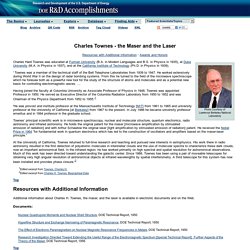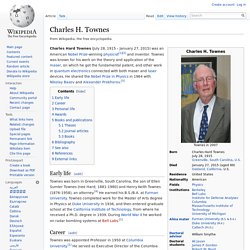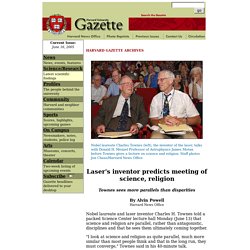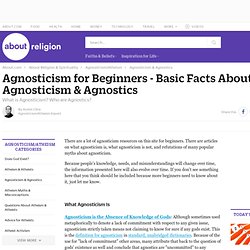

Scientists discover a simple way to cook rice that could halve the calories. Rice is a mainstay of dozens of different cuisines around the world, and pretty much the fuel that keeps uni students alive (alongside instant noodles). But although the versatile grain is cheap and easy to cook, there's one big issue with it - it's not that great for you. In fact, one cup of cooked rice contains around 240 starchy calories that can be quickly converted into fat if they're not burnt off. A Beautiful 1928 Letter to 16-Year-Old Jackson Pollock from His Dad. A Beautiful 1928 Letter to 16-Year-Old Jackson Pollock from His Dad. Charles Townes, the Maser, and the Laser. Charles Townes - the Maser and the Laser Resources with Additional Information · Awards and Honors Photo Courtesy of Lawrence Berkeley National Laboratory Charles Hard Townes was educated at Furman University (B.A. in Modern Languages and B.S. in Physics in 1935), at Duke University (M.A. in Physics in 1937), and at the California Institute of Technology (Ph.D. in Physics in 1939). ' Townes was a member of the technical staff of the Bell Telephone Laboratories from 1939 to 1947.

He worked extensively during World War II on the design of radar bombing systems. Having joined the faculty at Columbia University as Associate Professor of Physics in 1948, Townes was appointed Professor in 1950. 'He was provost and institute professor at the Massachusetts Institute of Technology [MIT] from 1961 to 1965 and university professor at the University of California [at Berkeley] from 1967 to the present. Top Resources with Additional Information Additional information about Charles H. Documents: Videos: Charles H. Townes. Charles Hard Townes (July 28, 1915 – January 27, 2015) was an American Nobel Prize-winning physicist[1][2] and inventor.

Townes was known for his work on the theory and application of the maser, on which he got the fundamental patent, and other work in quantum electronics connected with both maser and laser devices. He shared the Nobel Prize in Physics in 1964 with Nikolay Basov and Alexander Prokhorov.[3] Early life[edit] Townes was born in Greenville, South Carolina, the son of Ellen Sumter Townes (nee Hard; 1881-1980) and Henry Keith Townes (1876-1958), an attorney.[4] He earned his B.S. /B.A. at Furman University. Harvard Gazette: Laser's inventor predicts meeting of science, religion. Townes sees more parallels than disparities By Alvin Powell Harvard News Office Nobel laureate and laser inventor Charles H.

Townes told a packed Science Center lecture hall Monday (June 13) that science and religion are parallel, rather than antagonistic, disciplines and that he sees them ultimately coming together. "I look at science and religion as quite parallel, much more similar than most people think and that in the long run, they must converge," Townes said in his 40-minute talk. Townes' speech, "Logic and Mystery in Science and Religion," coincided with a weeklong conference at Harvard on recent advances by a new astronomical facility, the Submillimeter Array on the slopes of Hawaii's highest volcano, Mauna Kea. Harvard-Smithsonian Center for Astrophysics (CfA) Director Charles Alcock said that Townes was in Cambridge to deliver technical talks for the conference and was asked to address the more general topic in a public lecture. alvin_powell@harvard.edu.
Harvard Gazette: Laser's inventor predicts meeting of science, religion. Harvard Gazette: Laser's inventor predicts meeting of science, religion. Harvard Gazette: Laser's inventor predicts meeting of science, religion. Agnosticism for Beginners & Agnostics - Basic Facts About Agnosticism & Agnostics. There are a lot of agnosticism resources on this site for beginners.

There are articles on what agnosticism is, what agnosticism is not, and refutations of many popular myths about agnosticism. Because people's knowledge, needs, and misunderstandings will change over time, the information presented here will also evolve over time. If you don't see something here that you think should be included because more beginners need to know about it, just let me know. What Agnosticism Is Agnosticism is the Absence of Knowledge of Gods: Although sometimes used metaphorically to denote a lack of commitment with respect to any given issue, agnosticism strictly taken means not claiming to know for sure if any gods exist.
Weak Agnosticism vs. Agnosticism should be Philosophical: A person who is self-consciously agnostic is (or should be) agnostic for philosophical reasons derived from their epistemology and their ethics.